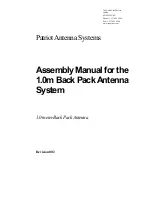
103
PC CONTROLLER SOFTWARE
· Step 4. Press the “Restart” icon to restart the antenna.
- Rate Sensor:
is used to calibrate the DC voltage output from the three rate sen-
sors (azimuth, elevation, and cross-level). These are used to sense antenna motion
that corresponds to the ship’s motion (roll, pitch, and yaw) for stabilizing the ped-
estal. The DC voltage output from each of the rate sensors may vary by an amount
which is directly proportional to the direction and rate of motion induced on it.
Before calibrating the rate sensors located in the Sensor box, make sure that the
antenna is placed on a rigid and flat platform. During the calibration process, any
motion of the antenna should be avoided as it can affect the antenna’s perfor-
mance. Proceed with the following steps to perform the calibration.
· Step 1. Enter Setup mode
· Step 2. Press the “Idle Mode” button to release the elevation and
cross level motor brakes while the antenna is in Setup mode.
· Step 3. Check whether or not the bubble is located at the center
of the button level. If not, move it to the center by following the
previous instruction of Tilt Sensor Bias adjustment.
· Step 4. Press the “Bias Check” button to calibrate the rate sensor.
A blue circle will be displayed next to the Bias Check button if the
calibration is completed. A red circle will be displayed if calibration
failed. A green circle will be displayed during the calibration
process.
- Conical Range:
The relative force of the motors controlling azimuth and eleva-
tion. Set the conical range while the antenna is in tracking mode.
- Parameter Setting: used to set the control parameter settings.
· Scan Offset: The scan offset is to offset the angle difference
between the black marker on the sub-reflector and the optical
sensor
· EL Adjust: The elevation adjustment is to offset the angle
difference between the mechanical elevation angle and actual
elevation angle.
















































